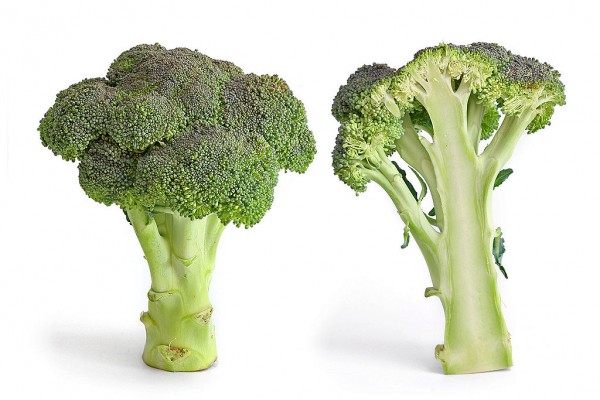
Broccoli is a cabbage family vegetable grown for its nutritious flower heads. Its green or purple florets have been known for several noteworthy, unique phyto-nutrients that are found to have disease prevention and health promoting properties.
Botanically, the vegetable is a member of large cruciferous (Brassica) family of vegetables. Broccoli's nutritional profile is impressive. It contains high levels of fiber (both soluble and insoluble) and is a rich source of vitamin-C, according to naturalnews.com.
In fact, just a 100 gram serving of broccoli will provide you with more than 150% of your recommended daily intake of vitamin C, which in large doses can potentially shorten the duration of the common cold.
Broccoli is also rich in vitamin A, iron, vitamin K, B-complex vitamins, zinc, phosphorus and phyto-nutrients.
Broccoli Nutrients
Broccoli nutrients provide many health benefits. It is a great source of vitamins K, A, and C, in addition to fiber, potassium, Folate, and lutein.
Broccoli is one of the very low calorie vegetables; provides just 34 calories per 100 g. Nevertheless, it is rich in dietary fiber, minerals, vitamins, and anti-oxidants that have proven health benefits. Total antioxidant strength measured in terms of oxygen radical absorbance capacity (ORAC) of broccoli is 1632 µmol TE/100 g.
Fresh Broccoli is a storehouse of many phyto-nutrients such as thiocyanates, indoles, sulforaphane, isothiocyanates and flavonoids like beta-carotene cryptoxanthin, lutein, and zea-xanthin. Studies have shown that these compounds by modifying positive signaling at molecular receptor levels help protect from prostate, colon, urinary bladder, pancreatic, and breast cancers.
Fresh vegetable is exceptionally rich source of vitamin-C. Provides 89.2 mg or about 150% of RDA per 100 g. Vitamin-C is a powerful natural anti-oxidant and immune modulator, helps fight against flu causing viruses.
Further, it contains very good amounts of another anti-oxidant vitamin, vitamin-A. 100 g fresh head provides 623 IU or 21 % of recommended daily levels. Together with other pro-vitamins like beta-carotene, alpha-carotene, and zea-xanthin, vitamin A helps maintain integrity of skin and mucus membranes. Vitamin A is essential for healthy eye-sight and helps prevent from macular degeneration of the retina in the elderly population, according to livescience.com.
Broccoli leaves (green tops) are an excellent source of carotenoids and vitamin A contain these compounds, several times greater than that in their flower-heads.
Fresh heads are an excellent source of folates; contain about 63 µg/100 g (Provides 16% of RDA). Studies have shown that consumption of fresh vegetables and fruits rich in folates during pre-conception, and pregnancy helps prevent neural tube defects in the offspring.
This flower vegetable is rich source of vitamin-K; and B-complex group of vitamins like niacin (vit B-3), pantothenic acid (vit.B-5), pyridoxine (vit.B-6), and riboflavin. The flower heads also have some amount of omega-3 fatty acids.
Furthermore, it is also a good source of minerals like calcium, manganese, iron, magnesium, selenium, zinc and phosphorus.
Fiber of broccoli diets high in fiber promotes digestive health. A high fiber intake can also help lower cholesterol.
Potassium; a mineral and electrolyte that is essential for the function of nerves and heart contraction.
Lutein may slow progression of age-related macular degeneration and cataracts.
Possible health risks of broccoli
Broccoli; however, also comes with components that are harmful to the body so everyone is still advised to watch their intake of it. For those who are taking blood thinning medications, the excessive intake of broccoli is not a wise move since it may interfere with the medications, thereby increasing their risk of suffering from stroke. Eating over one to two cups of broccoli a day may also increase the chances of dealing with kidney stones.
It should also be noted that the manner through which the vegetable is cooked can impact its ability to provide the right level of nutrition. Eating raw broccoli is the best way to get all its offered nutrients. Cooking it using a low cooking and steaming temperature for approximately five minutes also works in retaining its nutrients.
According to The Ohio State University Wexner Medical Center, people taking blood-thinning medications should watch their broccoli intake, since the vegetable's vitamin K content may interfere with the medication's effectiveness. Those with hypothyroidism should also limit their intake of broccoli

